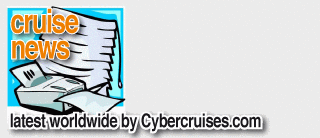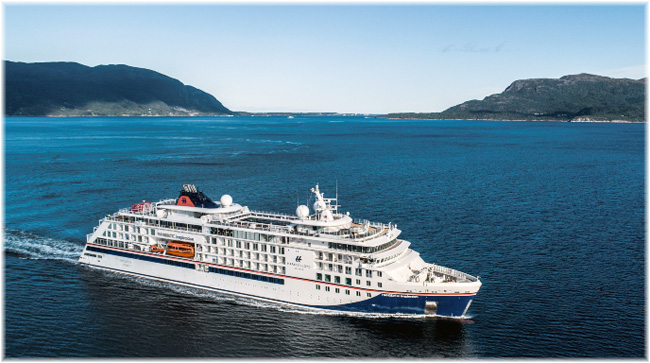How To Turn Risk Into An Opportunity: Part 1 – Other Cruise News: Victory And Hapag-Lloyd Cut Great Lakes Cruises – One Ocean To Make Proposal
 by Kevin Griffin
by Kevin Griffin
This week sees The Cruise Examiner introduce a guest editor, Dr Jennifer Holland, who over four weeks will deliver a four-part series concentrating on the perceptions of risk in the cruise industry. Elsewhere we look at how Covid-19 has affected two Great Lakes operators, causing the withdrawal of two ships with a total of 432 berths from that market this year. And we catch up with the latest news from One Ocean Expeditions. For them, after the edicts of Public Heath Canada and Transport Canada, there would have been no Canadian Arctic season this year anyway
THIS WEEK’S STORY
How To Turn Risk Into An Opportunity (Part 1) (Dr Jennifer Holland)
(*This is the first of a four-part series that will explore perceptions of risk in cruising. The aim is to shine a light on the positive ways the cruise industry can use the covid-19 crisis as an opportunity to “come back stronger than ever”).

Dr. Jennifer Holland – Cruise & Tourism Researcher – Industry Consultant – Secretary, Geographies of Leisure & Tourism Research Group (RGS) – Research Fellow, Royal Geographical Society
The covid-19 crisis has been devastating in many ways, but no industry has been hit harder than the cruise sector. Prior to covid-19, cruising was experiencing the highest growth of any sector in the global tourism industry. Passenger numbers were increasing every year for the past 2 decades, with 2020 poised to be the best year yet. Then came covid-19.
The last few months have seen an unprecedented global “pause” in operations and millions of jobs and billions in lost revenue. The mainstream media has recently portrayed cruise ships in a vitriolic light, which is feeding a negative narrative of cruises as ‘petri-dishes’ or ‘dungeons’. Yet, those in the industry know how wrong and misinformed this is.
The cruise industry has developed extensive health protocols and plans for managing and preventing outbreaks onboard, not just now, but for many years. This sadly is not getting through to the general public or mainstream media, and they need to know the extent of what each and every cruise line has been doing, and has always done, to protect their guests, crew and shoreside staff. Information reduces risk perceptions, and this has never been more important than right now.
Information needs to be shared more widely on the specific actions that have been taken and are in place for the future. These include the in-depth health screening before embarkation that was being done prior to most countries even responding to covid-19. Temperature checks were being done prior to embarkation, and even in port for shore excursions.
Each ship has developed outbreak prevention plans and extensively detailed measures following USPH and CDC requirements. Cruise ships have some of the best medical facilities in the world, and often offer better care than might be received ashore. This should also be emphasized, noting the incredible expertise, training and experience of the medical teams onboard.
My recent study in the UK found that people who have been on a cruise place enormous trust in the cruise companies to put proactive and preventative measures into place. For most cruisers, this will not change with covid-19.
In my study, several of the people interviewed had personally experienced outbreaks or disabling incidents while on a cruise, and all of them said they always felt safe and looked after and trusted the officers and staff to do the right thing. It has been shown in many studies that trust influences the perception of risk.
Right now, the media is presenting cruise lines as untrustworthy and a professional, measured response is needed to overcome this by presenting detailed information to address the worries and concerns of potential cruisers. Right now people are worried, understandably, and emotion has a huge influence on how risk is felt.
Information needs to be shared on company websites, social media, communications with existing customers and even Q&A that speak to these concerns directly. Most cruise lines are doing some, if not all of these but more can be done to highlight the proven ability of the industry to manage health risks in the past, and this will only be enhanced and improved moving forward.
Overwhelmingly my study showed both cruisers and non-cruisers feel safe and trust the familiar home-like environment of a cruise ship.

The cruise industry has developed extensive health protocols and plans for managing and preventing outbreaks onboard, not just now, but for many years
This feeling of safety and trust need to be reinforced. Cruising has been the safest form of leisure travel according to research conducted in 2019 (G.P. Wild for CLIA, 2019), and this should be emphasized going forward.
When dealing with uncertainty (risk) in decision-making, people rely on a number of heuristic principles to reduce the complex task of assessing probabilities and predicting outcomes. Heuristics are quick mental short-cuts people use intuitively when making decisions, and we probably don’t even realize we are making quick assessments and judgments based on our previous experience and acquired information – which is why greater information now is vital for long-term recovery.
Studies conducted after the Costa Concordia showed an initial and immediate decrease in bookings but once the event became a more distant memory (after about 90 days), cruise booking levels resumed. Heuristics also highlight the significance of emotion and affect on perceived risk and its impact on decision-making, and why people need to feel safe.
Understanding risk is important as whether real or imagined, the perception of risk changes how people make decisions. While the covid-19 crisis was very unwelcome, it presents an opportunity to highlight and share what we have been doing right for many years.
The cruise industry has managed outbreaks of norovirus, legionnaires, measles, H1N1 and influenza, and overcome global tourism crisis before, including SARS and 9/11. The cruise industry has encountered many risks including fires, collisions, severe listings, and with very minor exception, has calmly and professionally managed each one, following incredible safety procedures.
The focus now needs to be on communicating the legacy of experience and professionalism that is at the core of the cruise industry.
(* These articles are based on the research conducted in the UK which explored the influence of risk on deciding whether or not to choose a cruise for a holiday, and examined risk in cruising in relation to physical, health, social, psychological, time-loss, opportunity-loss, performance and functional risks.)
OTHER CRUISE NEWS
Victory And Hapag-Lloyd Cut Great Lakes Cruises
Victory Cruise Lines, the two small-ship cruise line operated by American Queen Steamboat Company, has cancelled all sailings in 2020 for its 202-berth Victory II and extended the suspension of operations of sister ship Victory I through June 30, 2020.
Victory I will resume service on July 5.
“Our top priority remains the health and safety of our guests, team members and crew,” said John Waggoner, founder and ceo of American Queen Steamboat Company. “We came to the difficult decision to consolidate the Victory II itineraries with Victory I due to the shortened nature of our 2020 season, as a result of the ongoing travel restrictions and port closures. It is our hope that in doing so, we can prioritize delivering the extraordinary Great Lakes sailing experience that our guests have come to expect from us.”
For all passengers booked on Victory I before June 30 and those booked onboard all Victory II 2020 sailings, no action is necessary. Victory’s customer service team will be reaching out directly to cruisers and travel agents to discuss available options, which include rebooking for a later date, a 125% future cruise credit or a full refund.
Meanwhile, Hapag-Lloyd’s 230-berth Hanseatic Inspiration has cancelled a cruise that would have visited the Ontario ports of Toronto, Windsor, Tobermory, Parry Sound, Thunder Bay, Sault Ste Marie and Little Current. Scheduled for early June, the cruise has been cancelled due to the Covid-19 pandemic and a global fleet recall by the Hamburg-based operator.
Hapag-Lloyd is bringing its fleet back to its home waters in Germany with four of its five ships headed for the berth. The Hanseatic Inspiration was scheduled to arrive in Hamburg on May 2 after the last of its guests were returned to port on March 21.
The ship was to have sailed from Toronto on June 3, followed by stops in Windsor, Tobermory, Parry Sound, Little Current, Sault Ste Marie and Thunder Bay for shore excursions before transitioning to US ports and finishing in Chicago on June 17.
The St Lawrence Seaway has been closed to passenger vessels until at least June 30, and Hapag-Lloyd has cancelled its 2020 summer season.
Two more visits from Hapag-Lloyd had been scheduled for the upper Great Lakes in 2021. I
One Ocean To Make Proposal
On April 17, declaring almost C$29.5 million in debt, One Ocean Expeditions filed a “notice of intention to make a proposal” to its creditors under Canada’s Bankruptcy and Insolvency Act..
According to documents posted by the One Ocean’s trustee PriceWaterhouse Coopers, the company has applied for thirty days’ protection from its creditors. This offers a “period of calm” during which the company can try to reach compromises with its creditors or look for someone to buy the company, using money from a sale to pay off creditors.
In a letter to its creditors dated April 22, managing director Andrew Prossin said One Ocean Expeditions is in “an arduous, time-consuming process of rebuilding.”
Prossin, a company founder, thanked creditors who were “patient and understanding” of the company’s woes.
“It’s part of the intangible that has and continues to help drive us through the storm,” he wrote, adding he had “empathy … for those understandably less tolerant of the challenges faced.”
This is the latest instalment in a complicated saga for the Canadian adventure cruise company – a saga that includes a grounding in the Arctic Ocean, as well as arrests in Iqaluit, Halifax and Buenos Aires.
In 2019, One Ocean’s RCGS Resolute was arrested in Buenos Aires for non-payment of debts. The ship’s owners, Bunny’s Adventure & Cruise Shipping Co., Ltd paid $3.6 million to avoid the ship being sold at auction.
This sum is reported to have gone to paying two European fuel suppliers, three South American ships agents, and 22 crew who were paid as a result of the action.
Meanwhile, the Covid-19 pandemic caused Transport Canada officials to halt the 2020 Arctic cruise season entirely.
(Kevin Griffin is managing director of The Cruise People Ltd and a director of specialist cruise operator Culture Cruises Ltd, both of London, England. For further information concerning cruises mentioned in this article readers can visit his blog)
(Dr Jennifer Holland recently completed her PhD at the University of Brighton. Her thesis explored tourists’ perceptions of risk in ocean cruising and provides practical implications for industry. Jennifer holds a BA (University of Alberta, 2000) and MTour (University of Otago, 2004), and has been involved in cruising and tourism for 17 years. She has worked for Royal Caribbean, Princess Cruises and Fairmont Hotels and Resorts, among others. Her research on risk in cruising has recently been featured on the BBC, CNA, and Skynews. email: jenniholland@outlook.com @jenniholland14








